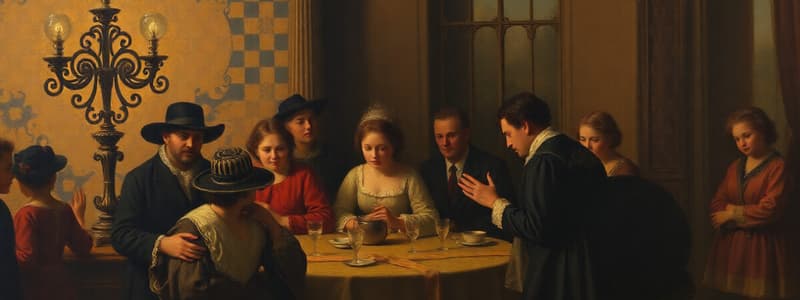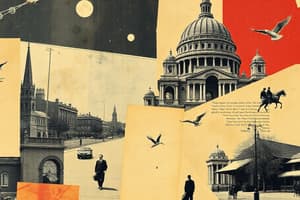Podcast
Questions and Answers
Which of the following best describes the focus of social history?
Which of the following best describes the focus of social history?
- The exploration of lived experiences of ordinary people and marginalized groups. (correct)
- The analysis of military strategies and international relations.
- The study of political ideologies and government structures.
- The examination of economic systems and financial markets.
Social history primarily relies on analyzing the actions of political elites and leaders to understand historical events.
Social history primarily relies on analyzing the actions of political elites and leaders to understand historical events.
False (B)
Name three topics commonly examined within the field of social history.
Name three topics commonly examined within the field of social history.
Family structures, gender roles, social class
__________ analysis in social history uses statistical data from sources like census records and tax lists to identify social trends.
__________ analysis in social history uses statistical data from sources like census records and tax lists to identify social trends.
Match the following methodologies with their descriptions:
Match the following methodologies with their descriptions:
Which type of source is most likely to be used in a qualitative analysis within social history?
Which type of source is most likely to be used in a qualitative analysis within social history?
Social history primarily focuses on short-term events rather than long-term social and economic structures.
Social history primarily focuses on short-term events rather than long-term social and economic structures.
What is one criticism of social history mentioned?
What is one criticism of social history mentioned?
Which historian is best known for their work, 'The Making of the English Working Class'?
Which historian is best known for their work, 'The Making of the English Working Class'?
__________ history examines the social construction of gender and the historical experiences of women and men.
__________ history examines the social construction of gender and the historical experiences of women and men.
Flashcards
Social History
Social History
The study of lived experiences of ordinary people and marginalized groups in the past, examining social structures, customs, and everyday life.
Quantitative Analysis
Quantitative Analysis
Using statistical data to analyze social trends and demographic patterns found in census records and tax lists.
Qualitative Analysis
Qualitative Analysis
Interpreting non-numerical sources (diaries, letters) to understand the beliefs, attitudes, and emotions of individuals and communities.
Family and Kinship
Family and Kinship
Signup and view all the flashcards
Gender and Sexuality
Gender and Sexuality
Signup and view all the flashcards
Social Class and Inequality
Social Class and Inequality
Signup and view all the flashcards
Demography and Population
Demography and Population
Signup and view all the flashcards
Popular Culture and Everyday Life
Popular Culture and Everyday Life
Signup and view all the flashcards
E.P. Thompson
E.P. Thompson
Signup and view all the flashcards
Natalie Zemon Davis
Natalie Zemon Davis
Signup and view all the flashcards
Study Notes
- Social history explores the lived experiences of ordinary people and marginalized groups.
- It examines social structures, customs, and everyday life.
- Social history challenges traditional historical narratives focused on politics, economics, and elites.
Scope and Definition
- Social history, also known as the new social history, became a distinct field in the mid-20th century.
- It broadened the scope of historical inquiry beyond traditional political and diplomatic events.
- Social history incorporates perspectives from sociology, anthropology, and other social sciences.
- It focuses on understanding the social context of historical events.
- It examines the collective experiences of various social groups.
- Topics include:
- Family structures
- Gender roles
- Social class
- Demographics
- Popular culture
- Crime
- Social movements
- Public health
- Education
- Poverty
Key Methodologies
- Quantitative analysis uses statistical data to analyze social trends and demographic patterns.
- Census records, tax lists, and other quantifiable documents are sources
- Enables historians to identify long-term social changes and variations across different populations
- Qualitative analysis emphasizes interpreting non-numerical sources, such as diaries, letters, oral histories, and folklore.
- Yields insights into the beliefs, attitudes, and emotions of individuals and communities
- Allows historians to understand the subjective experiences of people
- Interdisciplinary approaches integrate methods and theories from various disciplines.
- These can include sociology, anthropology, demography, and cultural studies.
- Enriches the analysis of social phenomena and their historical context
Key Themes and Topics
- Family and kinship
- Explores the evolution of family structures, marriage patterns, and parent-child relationships.
- Examines how social and economic changes have impacted family life over time.
- Investigates the roles of family in shaping individual identities and social norms.
- Gender and sexuality
- Analyzes the social construction of gender and the historical experiences of women and men.
- Examines the changing norms and attitudes towards sexuality.
- Investigates the impact of gender and sexuality on social, political, and economic life.
- Social class and inequality
- Studies the formation and evolution of social classes and their impact on social relations.
- Examines the causes and consequences of social inequality, including poverty, discrimination, and exploitation.
- Investigates social mobility and the opportunities available to different social groups.
- Demography and population
- Analyzes population trends, including birth rates, death rates, and migration patterns.
- Examines the impact of demographic changes on social, economic, and environmental conditions.
- Investigates the causes and consequences of demographic transitions.
- Popular culture and everyday life
- Explores the cultural practices, beliefs, and values of ordinary people.
- Examines the role of popular culture in shaping social identities and reinforcing or challenging social norms.
- Investigates the changing nature of leisure, entertainment, and consumption.
- Crime and deviance
- Studies the historical patterns of crime and their social context.
- Examines the causes and consequences of deviance.
- Investigates the evolution of law enforcement, punishment, and social control.
- Social movements and collective action
- Analyzes the emergence, development, and impact of social movements.
- Examines the role of collective action in promoting social and political change.
- Investigates the strategies, tactics, and ideologies of social movements.
Impact and Significance
- Social history has transformed the field of history.
- It gives voice to marginalized groups.
- It challenges traditional historical narratives.
- It provides a more nuanced and comprehensive understanding of the past.
- It influences other fields of historical inquiry, such as cultural, gender, and ethnic history.
- It has contributed to a greater awareness of social issues and inequalities.
Criticisms
- It is criticized for overemphasizing the experiences of ordinary people, at the expense of political and economic history.
- Some say it lacks a clear theoretical framework or methodology.
- Another point of criticism is that it is overly descriptive and lacking analytical rigor.
Key Figures
- E.P. Thompson
- He was a British historian known for work on the English working class.
- He authored "The Making of the English Working Class".
- He emphasized the importance of class consciousness and the agency of ordinary people.
- Natalie Zemon Davis
- She was an American historian known for her work on early modern France.
- She explored the lives of ordinary people and the role of culture in shaping social identities.
- She examined topics such as gender, religion, and popular culture.
- Fernand Braudel
- He was a French historian and a leader of the Annales School.
- He emphasized the importance of long-term social and economic structures in shaping historical events.
- He studied the Mediterranean world and its connections to global history.
Studying That Suits You
Use AI to generate personalized quizzes and flashcards to suit your learning preferences.




